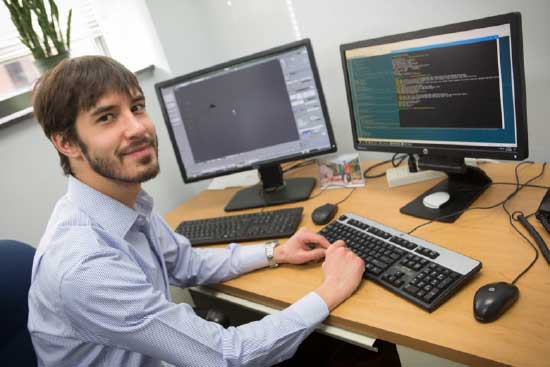Postdoctoral Researcher Helps NETL Improve Lifetime of Solid Oxide Fuel Cells
Meet Billy Epting
As clean energy production becomes a greater priority of U.S. policy makers, solid oxide fuel cells (SOFC) hold great promise. These devices efficiently generate electricity from a chemical reaction with little pollution. Additionally, they can operate using domestically available fuels, a factor which contributes to the nation’s energy independence.

At the National Energy Technology Laboratory (NETL) in Pittsburgh, Pennsylvania, postdoctoral researcher Billy Epting is focused on reducing the rate of performance degradation in solid oxide fuel cells.
In the Postdoctoral Research Program at the National Energy Technology Laboratory (NETL) in Pittsburgh, Pennsylvania, Billy Epting, who received his Ph.D. in mechanical engineering from Carnegie Mellon University, is researching methods to improve the viability of SOFCs.
With guidance from his mentor, Paul R. Ohodnicki, Jr., Ph.D., of the Solid Oxide Fuel Cell Field Work Proposal (FWP) team, Epting is focused on reducing the rate of performance degradation in SOFCs, which would in turn lower the cost.
Epting was no stranger to the Solid Oxide Fuel Cell FWP team at NETL when he entered the program. He first became involved with the team as a side project during his doctoral studies. He did sample preparation and imaging of the team’s cells for microstructural analysis.
“When I graduated with my Ph.D., I felt there was still a lot of interesting, unexplored territory related to the SOFC team. So I applied for this program, hoping I could continue exploring these questions,” Epting said. “I also knew that the other people on this team were excellent researchers, and there would be stimulating discussions about my topic and contributions I could make to other projects.”
Specifically, Epting is interested in determining the links between microstructure, electrochemical performance and performance degradation of SOFCs to ultimately create tools that allow others to ask similar questions about their own samples.
“The microstructure changes while fuel cells degrade in performance,” Epting explained. “My research focuses on understanding the microstructure, its relationship to cell performance, and how the microstructure and its influence on performance change over the lifetime of a cell.”
Another piece of Epting’s project involves understanding how spatial distributions, rather than different overall values, of properties might impact both performance and performance degradation of a cell. He is developing, testing and using programs that find such distributions. He intends to combine his findings into one format that will benefit his team’s research, as well as others.
Epting plans to remain at NETL in the near term, though eventually he hopes to combine his passion for research with teaching. Overall, he believes his participation in the program will be beneficial for his future career path.
“This program has given me a lot of opportunities to expand my skill set—learn new software tools, programming languages, simulation approaches and analytical techniques—while also solving important problems and doing exciting research with a talented team,” Epting said.
The NETL Postgraduate Research Program is administered by the Oak Ridge Institute for Science and Education (ORISE) for the U.S. Department of Energy.


